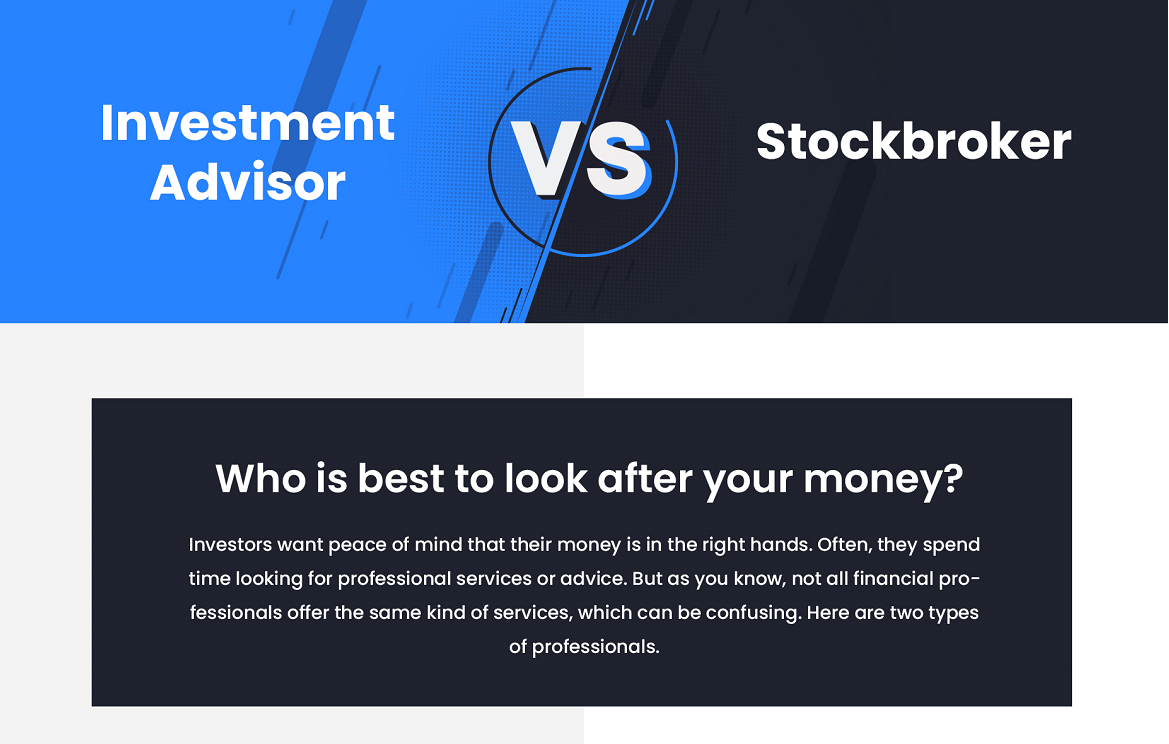
Investment Advisor vs. Stockbroker: What’s the difference?
When you are looking for guidance on managing your wealth, questions that come to your mind might be: do you need a stockbroker or a registered investment advisor? What is the difference?
You would assume the roles and duties should be straightforward, and there would be a direct distinction between people who consider themselves advisors and those who think themselves stockbrokers. Unfortunately, this is not the case, causing a lot of ambiguity between the two. You need to be mindful of some important distinctions when deciding who you’re going to trust with some of the most personal information of your life. Read on to learn about the difference between an investment advisor and a stockbroker.
What Is an Investment Advisor and Stockbroker?
As expert managers of their clients’ investment accounts, both financial advisors and stockbrokers earn their keep. They ‘re only doing so in several ways and money management philosophies.
What Do Investment Advisors Do?
If you need assistance in making investment decisions and managing your portfolio, you may want to seek advice from an investment advisor.
An investment advisor works with you to identify the best investment for your portfolio. To do so, they need:
a) to get a detailed understanding of your financial condition,
b) to get a detailed understanding of your investment goals,
c) to get a detailed understanding of your risk tolerance.
The investment advisor must establish the fullest details of your family circumstances, health and future plans before providing advisory services.
Investment advisors will review your current portfolio, and propose an investment plan based on your objectives. They will buy investments on your behalf, with your permission. Investment advisors will tell you what types of securities to invest in, such as stocks or mutual funds. They will also advise you on the risks associated with each type of investment and your expected return rate. They will also let you know what kinds of taxable income your investment can generate, and how to make your investment as tax-efficient as possible.

How Are Investment Advisors Paid?
Investment advisors are paid in many ways, with customer payment choices increasing as the advisory industry adapts to technological shifts, service delivery, and market demand:
1. By commission only:
This choice is waning, but only on a commission basis do some investment advisors get paid. A commission-based payment model means a customer pays an upfront fee to receive investment and financial counseling.
For instance, if an investment advisor suggests investing $10,000 in a mutual fund paying a 3% commission, the investor pays a $300 advisory fee and leaves $9,700 to invest in the fund. To recommend the fund, the investment manager gets a share of the amount.
2. By Fee only:
The options for payments for fees are increasingly popular, as investors (particularly younger ones) prefer to pay for their financial advice with a “fixed subscription model,” much like they do with Netflix NFLX or Apple AAPL News+ subscription services. Investment advisors who operate only on a fee basis typically work independently or for a licensed Investment Advisor Firm, and do not work for a big-money management business. If you opt for a premium only, you choose continuous qualified money management advice on an annual or (constant) monthly basis.
To investment clients, there are multiple payment options. For example, if you pay, say $75 per hour for specific time spent with a financial adviser, an investment advisor can charge a ‘pay you go’ hourly Fee. And for a particular menu of services, such as fund management and property planning, an investment advisor can charge an apartment fee where clients can pay several thousand dollars in return for unique and continuous investment advice over the specified duration.
What Do Stockbrokers Do?
Stockbrokers are stock exchange members, which allows them on behalf of customers to buy and sell stocks, bonds and other securities or provide services that enable investors to trade on the stock exchange on their own. Stockbrokers can give advice on which investments to buy or operate on execution-only services. Stockbrokers get the profits by charging fees for their services.
Nowadays, this type of service mostly provided through online trading platforms.
How Are Stockbrokers Paid?
In general, stockbrokers are paid for by commissions created on behalf of customers by executing investment businesses.
Based on the services, there are major differences in how much a stockbroker will charge customers.
The brokerage fees of trading platforms are usually either flat fee or based on the percentage of the transaction. Flat fee, for example, can vary from $5 to $20 per transaction.
It is also likely that the stockbrokerage customers will have to make a minimum deposit on their brokerage account before leveraging the services. The down payment may be $10,000 to a full-service stockbroker, depending on the level of service you get from a stockbroker.
Finally, A competent choice between an investment advisor and a stockbroker needs thorough research, careful planning, and a thorough examination of your own financial and investment needs. Are you lost and don’t know what to choose? Choose the platform where you can enjoy all types of investment services at the same time. Nowadays, Fintech brings a technology based on innovative algorithms and user-friendly interfaces on a platform that gives clients 24/7 access to their investments from the comfort of their homes. Full financial planning service is available with Wealthface with the commission varying only from 0.5% to 0.75%. The company plays the role of a Fiduciary investment advisor, which means it always puts the client’s interest first, removing any conflicts of interest that sometimes can exist between stockbroker and client.




